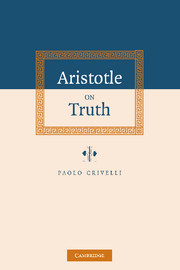Book contents
- Frontmatter
- Contents
- Acknowledgements
- Notes on the text
- List of abbreviations of titles of Aristotle's works
- Introduction
- Part I BEARERS OF TRUTH OR FALSEHOOD
- Chapter 1 States of affairs, thoughts, and sentences
- Chapter 2 Truth conditions for predicative assertions
- Chapter 3 Truth conditions for existential assertions
- Part II ‘EMPTY’ TERMS
- Part III TRUTH AND TIME
- Appendix 1 Metaph. Θ 10, 1051b1: the text
- Appendix 2 Metaph. Θ 10, 1051b2–3: the text
- Appendix 3 Int. 7, 17b16–18: the text
- Appendix 4 The two-place relations in Aristotle's definition of truth
- Appendix 5 Aristotle's theory of truth for predicative assertions: formal presentation
- Appendix 6 The failure of bivalence for future-tense assertions: formal presentation
- References
- Index of names
- Index of subjects
- Index of passages
Chapter 2 - Truth conditions for predicative assertions
Published online by Cambridge University Press: 22 September 2009
- Frontmatter
- Contents
- Acknowledgements
- Notes on the text
- List of abbreviations of titles of Aristotle's works
- Introduction
- Part I BEARERS OF TRUTH OR FALSEHOOD
- Chapter 1 States of affairs, thoughts, and sentences
- Chapter 2 Truth conditions for predicative assertions
- Chapter 3 Truth conditions for existential assertions
- Part II ‘EMPTY’ TERMS
- Part III TRUTH AND TIME
- Appendix 1 Metaph. Θ 10, 1051b1: the text
- Appendix 2 Metaph. Θ 10, 1051b2–3: the text
- Appendix 3 Int. 7, 17b16–18: the text
- Appendix 4 The two-place relations in Aristotle's definition of truth
- Appendix 5 Aristotle's theory of truth for predicative assertions: formal presentation
- Appendix 6 The failure of bivalence for future-tense assertions: formal presentation
- References
- Index of names
- Index of subjects
- Index of passages
Summary
This chapter examines what truth conditions for predicative assertions Aristotle is committed to.
Section 1 addresses a preliminary issue: Aristotle's conception of universals. Universals are neither concepts nor linguistic expressions: rather, universals are objects whose nature is neither mental nor linguistic. A universal is an object which is predicated of many things, an individual is an object which is not predicated of many things.
Sections 2–4 concentrate on the truth conditions for singular and quantified predicative assertions (evidence is mainly provided by passages from de Interpretatione). Section 2 addresses the discussion of truth and falsehood in de Interpretatione 1, where Aristotle alludes to the theory of Metaphysics Ε 4: in an affirmative (negative) predicative belief one object is joined with (separated from) one object. The bulk of section 2 is taken up by a discussion of two objections that could be raised against connecting de Interpretatione 1 with Metaphysics Ε 4. Section 3 addresses Aristotle's theory of assertions. Not every sentence is true or false (prayers are neither), and every sentence that is true or false is an assertion (the converse fails). Every affirmative predicative assertion asserts something ‘about’ something, every negative predicative assertion asserts something ‘away from’ something. The operation of asserting-about (asserting-away-from) performed by an affirmative (negative) predicative assertion is the linguistic counterpart of the operation of joining (separating) performed in an affirmative (negative) predicative belief. In both cases the operations are performed on objects (not on linguistic expressions or on thoughts).
Information
- Type
- Chapter
- Information
- Aristotle on Truth , pp. 77 - 98Publisher: Cambridge University PressPrint publication year: 2004
